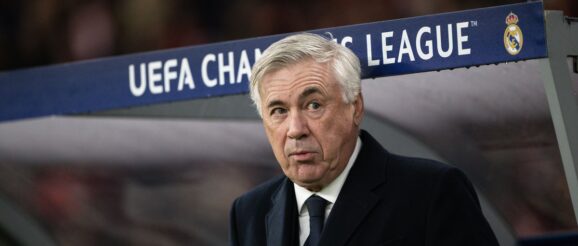Ancelotti’s Alchemy: Turning Adversity into Innovation

In the fast-changing realm of football, where fortunes flip faster than Madrid’s headlines, Carlo Ancelotti’s stewardship at Real Madrid is crafting a story of unexpected calm, assurance, and hope. At the season’s halfway point, Ancelotti has not just quieted his doubters but has also reimagined what it means to overcome great odds. The challenge Ancelotti faced this season was monumental from the outset. The loss of Karim Benzema was just the beginning. More crucially, the team was rocked by significant injuries to key players like Thibaut Courtois and Éder Militão right at the start. These injuries could have derailed any team’s aspirations, especially considering their pivotal roles. Their absence left a gaping hole in the team’s spine, a challenge that would test any manager’s mettle. Yet, Ancelotti’s Madrid has risen from these challenges, not weakened, but remarkably fortified. This season, Ancelotti has proven he’s more than just a ‘ former great manager’ ; he’s a wizard at adapting and thriving even in the present day. Each injury, rather than being a hindrance, has become an opportunity for creative solutions. This was evident in how he managed the team dynamics, ensuring that every player stepping in not only understood their role but also felt integral to the team’s success. The periods of absence chart reads like a battle log, with each square of absence marking a trial in the season’s campaign. Yet, under Ancelotti’s command, these have not been mere setbacks but moments for others to rise, underscoring his exceptional ability to manage and motivate his squad. The defeat against Atletico Madrid was a pivotal moment. Rather than seeing it as a blow, Ancelotti used it as a trigger for transformation. He demonstrated tremendous man-management skills, boosting the morale of his players and fostering a sense of unity and resilience. His ability to maintain a positive team atmosphere, even in the face of adversity, has been paramount. He encouraged players to step up, take on new responsibilities, and seize their moment in the spotlight — just like Lucas Vazquez did on the final matchday before Christmas, against Alaves. Ancelotti’s approach to squad rotation and player motivation has been exemplary. He has managed to keep the team fresh and motivated, even as he navigated the complex waters of multiple injuries. Jude Bellingham has flourished beyond even the wildest expectations under his guidance. Under Ancelotti, Bellingham is showcasing bullish excellence in both attacking and defensive roles — a testament to the Italian coache’s ability to harness and develop versatility. The team’s strategic shift to a fluid 4-2-2-2 formation, with the duo of Fede Valverde and Toni Kroos in the midfield, brought a new harmonic balance, allowing Real Madrid to play a game that left opponents struggling to keep up. With half of the Once de Gala out on the sidelines, the comfort with which Madrid navigated some of the games seemed unreal. MORE on Ancelotti’s sublime relationist approach in this episode of the @realdealpods episode: Real Madrid’s resilience is not just apparent but also quantifiable. Only three teams—Inter, Nice, and Juventus—have conceded fewer goals than Madrid in the Top 5 leagues this season so far. This achievement is even more impressive considering the absence of their entire starting lineup from the Champions League final two years ago. A three-game rolling average chart for goals conceded against non-penalty expected goals against (npxGA) shows a defense that’s as strong as ever. Despite the early absence of Courtois and Militão, Madrid’s actual goals conceded have consistently outperformed the expected metrics, reflecting the squad’s disciplined execution of defensive strategies. Both Kepa and Lunin have performed better than they were expected to. Offensively, the team’s efficiency is captured in a chart comparing goals scored against expected goals. The team has consistently outscored its expected tally, underscoring a forward line that is more efficient than originally imagined. Madridistas have witnessed a squad constantly reshuffled due to the whims of fate, yet never losing its shape or spirit. This is the Ancelotti alchemy—turning adversity into innovation, setbacks into comebacks, and doubts into beliefs. Regardless of where the team stands at the season’s close, there is a profound sense of gratitude that must be afforded to Ancelotti. It’s not merely the victories nor the points tally, but the way he has navigated through a storm of injuries with unwavering resolve and strategic ingenuity that warrants admiration. In the end, the season will bring its own set of narratives. The story that Ancelotti has written this season is one of resilience, showcasing his skills in leadership and, most importantly, his ability to shape a team that simply refuses to quit. It may not have been as hipster as some would like or as techy as some would prefer, but there is no doubt that it’s working its magic.
